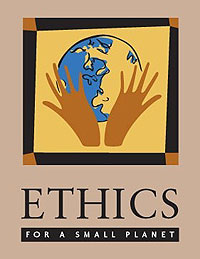| Book Review Archive 29.12.02 [63] |
|
||||
|
A Communications Handbook from the Biodiversity Project
 A resurgence of ethical concerns is bringing new energy to the
environmental movement. Moral outrage helped to ban DDT and clean up
burning rivers in the movement's early years. But decades of courtroom
battles and legislative miasma have painted environmental issues into a
scientific and legal corner. Now, environmentalists are rekindling the
convictions that still run deep within the public.
The editor of Ethics for a Small Planet, a recently published communications
handbook that teaches people new ways to talk about environmental action,
says environmentalists have an opportunity to link people's environmental
concerns with their deepest values and religious convictions. The book is
part of a growing movement that encourages people to think about the
environment in moral terms, e.g. "What Would Jesus Drive" campaign.
"We are losing species and habitat at an astonishing rate. To survive we are
going to have to dig deeply into our values - our collective sense of right
and wrong about ourselves, the generations that will follow us and the life
with which we share the planet," said Jane Elder, Executive Director,
Biodiversity Project, which produced Ethics for a Small Planet: A
Communications Handbook.
The problem, according to Elder, is that environmentalists tend to overly
rely on data and facts to convince people, even though society's most
meaningful change (ending slavery or child labor, for example) has come
about when people feel a moral imperative that tells them 'it's the right
thing to do.' "For me, caring about the environment is as much about love
and respect for generations that follow me as it is about law enforcement
and good candidates, I can't separate them."
The Biodiversity Project is part of a growing movement in both the
environmental and faith communities that hopes to bring about lasting reform
in how people view the natural environment. Ethics for a Small Planet
contributes to that effort by explaining how religious and moral values of
the world's many cultures play a fundamental role in responding to
environmental concerns.
This movement includes many local, faith-based environmental initiatives, as
well as events at the national and international level, including:
A resurgence of ethical concerns is bringing new energy to the
environmental movement. Moral outrage helped to ban DDT and clean up
burning rivers in the movement's early years. But decades of courtroom
battles and legislative miasma have painted environmental issues into a
scientific and legal corner. Now, environmentalists are rekindling the
convictions that still run deep within the public.
The editor of Ethics for a Small Planet, a recently published communications
handbook that teaches people new ways to talk about environmental action,
says environmentalists have an opportunity to link people's environmental
concerns with their deepest values and religious convictions. The book is
part of a growing movement that encourages people to think about the
environment in moral terms, e.g. "What Would Jesus Drive" campaign.
"We are losing species and habitat at an astonishing rate. To survive we are
going to have to dig deeply into our values - our collective sense of right
and wrong about ourselves, the generations that will follow us and the life
with which we share the planet," said Jane Elder, Executive Director,
Biodiversity Project, which produced Ethics for a Small Planet: A
Communications Handbook.
The problem, according to Elder, is that environmentalists tend to overly
rely on data and facts to convince people, even though society's most
meaningful change (ending slavery or child labor, for example) has come
about when people feel a moral imperative that tells them 'it's the right
thing to do.' "For me, caring about the environment is as much about love
and respect for generations that follow me as it is about law enforcement
and good candidates, I can't separate them."
The Biodiversity Project is part of a growing movement in both the
environmental and faith communities that hopes to bring about lasting reform
in how people view the natural environment. Ethics for a Small Planet
contributes to that effort by explaining how religious and moral values of
the world's many cultures play a fundamental role in responding to
environmental concerns.
This movement includes many local, faith-based environmental initiatives, as
well as events at the national and international level, including:
Islamic Foundation for Ecology and Environmental Sciences. Has set up an extensive training program in environmental teachings based on the Qur'an. Visions and Values. A working group of senior staff from the nation's leading environmental organizations. The group is looking at ways to integrate values more fully into the work of the environmental movement. Patriarchate of the Greek Orthodox Church, Bartholomew I and Pope John Paul, issued a joint statement in June 2002, saying "God has not abandoned the world. It is His will that His design and our hope for it will be realized through our co-operation in restoring its original harmony." The Biodiversity Project advocates for biodiversity by communicating with the public about the ways lifestyle choices and community involvement can re-connect people to nature and build a better future.
|
|||
| BLUE is looking for short fiction, extracts of novels, poetry, lyrics, polemics, opinions, eyewitness accounts, reportage, features, information and arts in any form relating to eco cultural- social- spiritual issues, events and activites (creative and political). Send to Newsdesk. |
